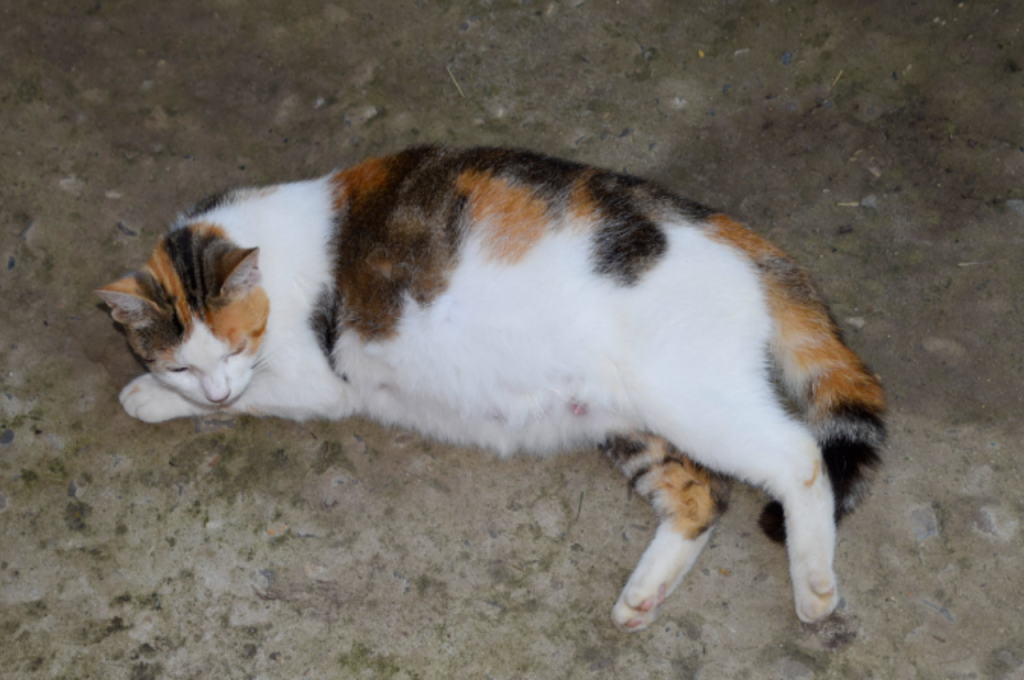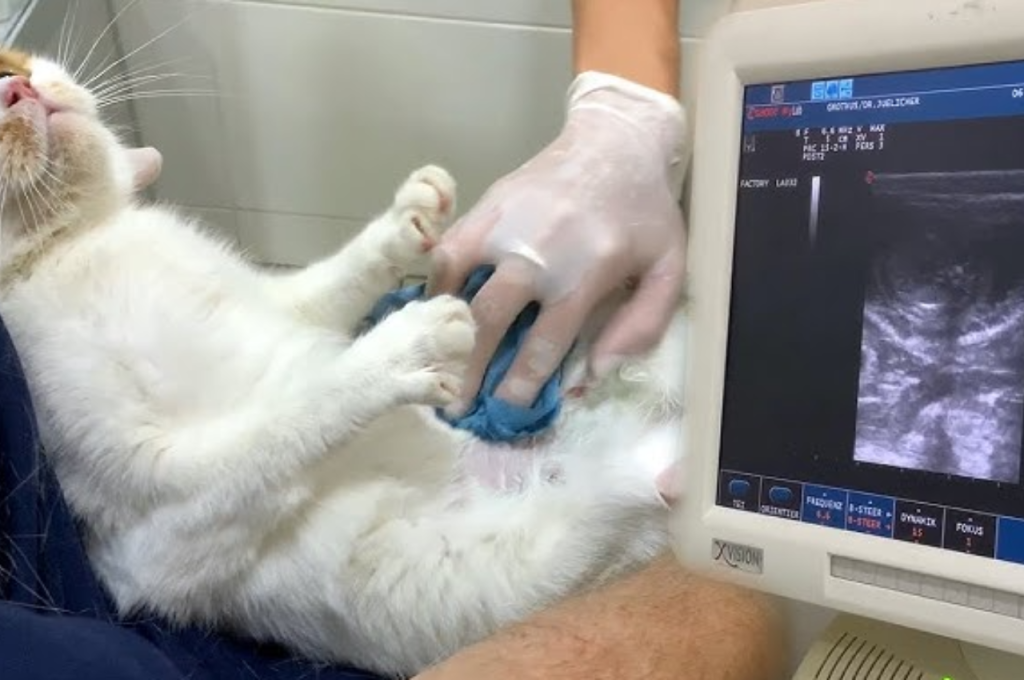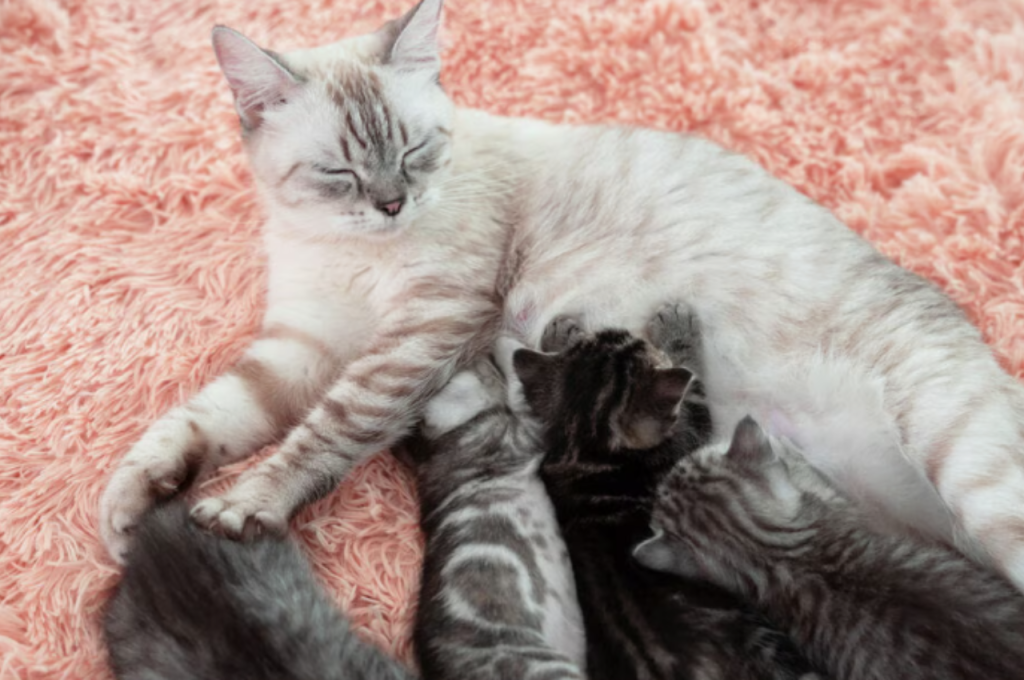A pregnant cat needs a balanced diet and a comfortable and stress-free environment. In order to ensure the health and well-being of a pregnant cat, it is important to provide her with proper care and attention.
This includes regular visits to the veterinarian, providing her with a nutritious diet, and creating a calm and comfortable environment for her to rest and relax. Additionally, pregnant cats may benefit from additional vitamins and minerals in their diet, as well as extra attention and affection from their owners. By providing the necessary care and attention, owners can help to ensure a healthy pregnancy and successful delivery for their feline companion.
Identifying Pregnancy in Cats
A pregnant cat needs proper nutrition, a comfortable place to rest, and regular veterinary check-ups. Identifying pregnancy in cats can be tricky, but once confirmed, it’s important to provide the necessary care for a healthy pregnancy and delivery.

Signs to Look for
Pregnant cats display specific signs that can help you identify their condition. Observe changes in behavior and appetite. Notice swollen nipples and increased abdominal size.
Confirming With a Vet
Visiting a vet is essential to confirm your cat’s pregnancy. The vet can perform an ultrasound or palpation to verify. Discuss care and nutrition requirements with the vet.
Optimal Nutrition for The Expectant Feline
During pregnancy, a cat requires optimal nutrition including high-quality protein, essential vitamins, and minerals for her health and the development of her kittens. It is crucial to provide a balanced diet to support the mother cat’s increased nutrient needs during this critical stage.
Choosing The Right Food
During pregnancy, a cat’s nutritional needs change significantly. It’s essential to provide your pregnant feline with the right food to support her health and the development of her kittens. Look for a high-quality cat food that is specifically formulated for pregnant or nursing cats. Such foods are designed to provide the necessary nutrients, including increased protein and calories, that are crucial for your cat’s well-being during this time. Consult with your veterinarian to determine the best food option for your pregnant cat.
Supplements for Fetal Development
In addition to a balanced diet, certain supplements can further enhance the development of the kittens. One important supplement is omega-3 fatty acids, such as fish oil, which are beneficial for brain and eye development. Another crucial nutrient is folic acid, which aids in preventing birth defects.
Providing these supplements in the appropriate dosage can contribute to the overall health of the unborn kittens. However, always consult with your veterinarian before giving any supplements to your pregnant cat, as they will guide you on the proper dosage and ensure the safety of both the mother and the kittens. During pregnancy, it is crucial to provide your cat with optimal nutrition to support her health and the growth of her kittens. This includes choosing the right food specifically formulated for pregnant or nursing cats and considering the use of supplements to enhance fetal development.
By ensuring your cat receives the necessary nutrients, you can help promote a healthy pregnancy and give her kittens the best start in life. Remember to consult with your veterinarian for personalized advice tailored to your cat’s specific needs.
Creating a Safe Nesting Area
Creating a Safe Nesting Area is crucial for your pregnant cat to ensure a comfortable and stress-free environment for giving birth to her kittens. As a responsible pet owner, it’s important to provide a secure and cozy space where your cat can feel safe and relaxed during this special time.
Selecting The Location
Choose a quiet and secluded area in your home where your pregnant cat can have privacy and peace. This can be a spare room, closet, or any low-traffic area that offers tranquility. Avoid placing the nesting area near loud appliances or high-traffic zones to minimize stress for your cat.
Essential Nesting Materials
Prepare the nesting area with soft and comfortable materials such as blankets, towels, or soft bedding. These materials will provide warmth and cushioning for your cat and her newborn kittens. Additionally, consider providing a nesting box or bed specifically designed for cats to offer a cozy and secure space for giving birth and nursing.
Veterinary Care During Pregnancy
During pregnancy, a cat requires proper veterinary care to ensure her health and the well-being of her kittens. This includes regular check-ups, proper nutrition, and vaccinations tailored for pregnant cats. The guidance of a veterinarian is essential for a successful and healthy pregnancy.
Routine Check-ups
During pregnancy, it is crucial to provide your cat with proper veterinary care to ensure a healthy and successful pregnancy. Regular check-ups with a veterinarian are essential to monitor the progress of the pregnancy and address any potential issues that may arise. These routine check-ups allow the vet to assess the overall health of the pregnant cat and provide necessary vaccinations and treatments.

Dealing With Health Concerns
Pregnancy can sometimes bring about health concerns for cats, just as it does for humans. It is important to be aware of potential issues and know how to address them. If you notice any changes in your cat’s behavior or physical condition, it is recommended to consult with a veterinarian as soon as possible. Some common health concerns during pregnancy include:
- Weight gain: Pregnant cats may experience weight gain due to the development of kittens. However, excessive weight gain or sudden weight loss should be monitored and discussed with a veterinarian.
- Nutrition: A pregnant cat’s nutritional needs change during pregnancy. It is essential to provide a balanced and nutritious diet specifically formulated for pregnant or nursing cats. Your veterinarian can guide you on the appropriate diet for your cat.
- Gestational complications: Cats, like humans, can experience complications during pregnancy. These may include difficult labor, fetal distress, or even miscarriage. Regular veterinary check-ups can help detect and address these complications.
- Parasites: Parasites can pose a risk to both the mother cat and her developing kittens. Regular deworming and flea prevention are necessary to ensure the well-being of the pregnant cat.
In conclusion, veterinary care during pregnancy is vital to ensure the health and well-being of your pregnant cat. Routine check-ups allow for monitoring the progress of the pregnancy and addressing any health concerns that may arise. By being proactive and seeking veterinary care, you can provide the best possible support for your pregnant cat throughout her pregnancy journey.
Handling and Socializing
During pregnancy, a cat needs a quiet and stress-free environment for handling and socializing. Providing a cozy and safe space for the expectant mother is essential to ensure her comfort and well-being. Additionally, gentle social interactions with familiar humans can help the pregnant cat feel secure and supported.
Approaching Your Pregnant Cat
Approaching your pregnant cat requires patience and a gentle approach. Cats can become more sensitive during pregnancy, so it is important to approach your cat slowly and calmly. Loud noises or sudden movements can startle your cat, which can lead to stress and anxiety.
When approaching your pregnant cat, try to get down to their level and extend a hand for them to sniff. Let your cat sniff your hand and take the lead on initiating contact. If your cat seems uncomfortable or disinterested, give them space and try again later.
Interacting with Other Pets
If you have other pets in your home, it is important to introduce them to your pregnant cat slowly and carefully. Cats can become protective of their space during pregnancy, so it is important to give your cat time to adjust to the presence of other animals.
When introducing your cat to other pets, start by keeping them separated and slowly introduce them to each other over time. Use positive reinforcement, such as treats and praise, to encourage good behavior. If your cat becomes aggressive or anxious around other pets, give them space and try again later.
Handling and socializing your pregnant cat is important for their overall well-being and the health of their kittens. During pregnancy, it is important to handle your cat gently and avoid any unnecessary stress or discomfort.
You can socialize with your cat by spending time with them and providing plenty of opportunities for play and interaction. This can help reduce stress and keep your cat healthy and happy during pregnancy. However, it is important to avoid overstimulating your cat, as this can be harmful to both your cat and their kittens.
In conclusion, approaching your pregnant cat with patience and care, introducing them to other pets slowly and carefully, and handling and socializing your cat appropriately can help ensure a healthy and happy pregnancy for your furry friend.
Preparing for Labor and Delivery
To prepare for labor and delivery, a pregnant cat needs a quiet, comfortable space where she feels safe. This area should be lined with soft bedding and placed in a low-traffic part of the home. Ensure she has easy access to food, water, and a litter box. Additionally, keep necessary supplies like clean towels, a heat source, and your veterinarian’s contact information handy.
Understanding what a pregnant cat needs is crucial for a smooth and stress-free delivery. Regular vet check-ups and monitoring of her behavior can also help anticipate the labor process and address any complications promptly.
Recognizing Signs of Labor
During the final weeks of pregnancy, it’s essential to be vigilant for the signs of labor in your pregnant cat. Keep an eye out for behavioral changes, nesting behavior, and increased vocalization. Additionally, monitor for physical signs such as a drop in body temperature and the appearance of milk in her teats.
Emergency Preparedness
It’s crucial to be prepared for any unforeseen complications during the labor and delivery process. Assemble an emergency kit that includes clean towels, sterile gloves, and contact information for an emergency veterinary clinic. Furthermore, familiarize yourself with potential complications and their corresponding first-aid procedures.
Postpartum Care for Mothers and Kittens
Postpartum care for mothers and kittens is crucial for ensuring the health and well-being of the entire feline family. Providing the right support and environment during the initial hours after birth and throughout the nursing period is essential for the mother cat’s recovery and the proper development of the kittens.

Initial Hours After Birth
Immediate attention is required to ensure the mother cat’s comfort and the well-being of the newborn kittens. Creating a warm, quiet, and safe space for the mother and her litter is imperative. Monitoring the mother cat to ensure she is nursing the kittens and providing nutritious food and fresh water is essential. Ensuring the mother cat has a clean and comfortable environment will aid in her recovery.
Ongoing Support for Nursing
Continual observation of the mother and kittens is necessary to address any potential concerns. Providing a nutrient-rich diet for the mother cat is vital to support her during the nursing period. Regular veterinary check-ups for the mother cat and the kittens are crucial to ensure their health and development. Creating a stress-free environment for the mother cat will help in promoting successful nursing.
Conclusion
Ensuring your pregnant cat’s needs are met is crucial for her health and the kittens. Providing proper nutrition, a quiet and safe space, and regular vet check-ups are essential. By understanding and fulfilling these requirements, you can support your cat through this special time with care and attention.
